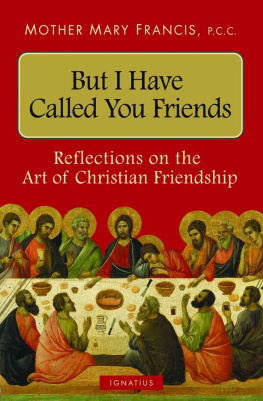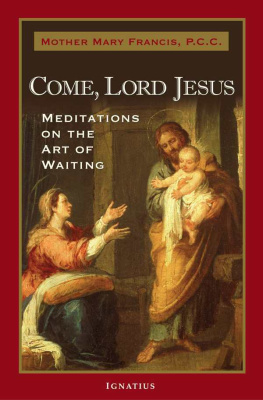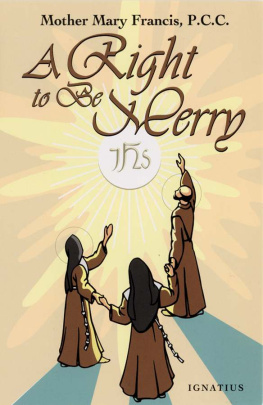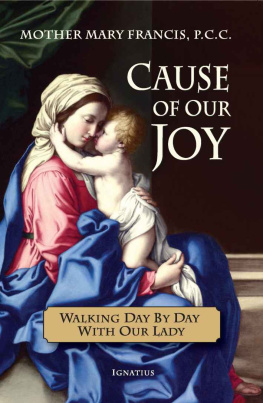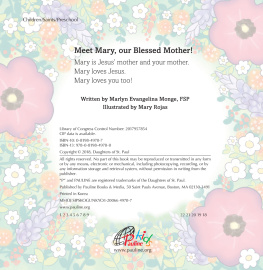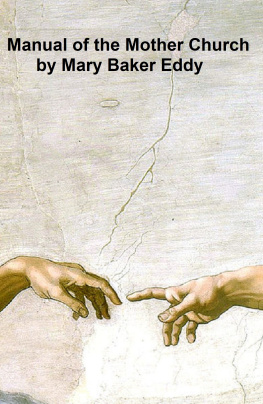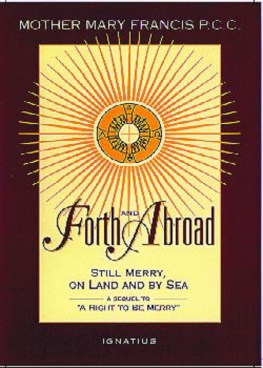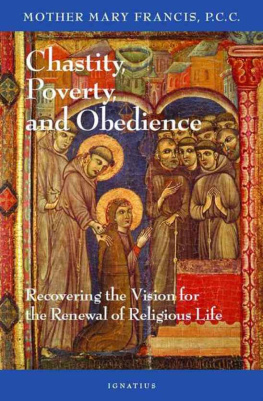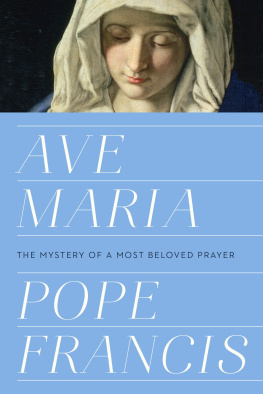BUT I HAVE CALLED YOU FRIENDS
BUT I HAVE
CALLED YOU
FRIENDS
Reflections on the Art of Christian Friendship
by
MOTHER MARY FRANCIS, P.C.C.
IGNATIUS PRESS SAN FRANCISCO
Cover art: The Last Supper by Duccio (ca. 1260-1319)
Museo dellOpera Metropolitana, Siena, Italy
Scala/Art Resource, N.Y.
Cover design by Riz Boncan Marsella
2006 by Ignatius Press
All rights reserved
ISBN 978-1-58617-080-6
ISBN 1-58617-080-5
Library of Congress Control Number 2006921888
Printed in the United States of America
In Memory of
our friend
Andre Emery
CONTENTS
FOREWORD
In the early afternoon of February 11, 2006, the feast of Our Lady of Lourdes, the vibrant soul of Mother Mary Francis of Our Lady departed the worn-out little body that had housed it for nearly eighty-five years. Mother had a genius for friendship, as each of the twenty-five weeping Poor Clares who surrounded her bed in the small monastery infirmary could testify. We who had been privileged to watch in turn around her bed for nearly two months experienced the bonds of love deepening each day as she communicated her love and gratitude by word, by facial expression, by gesture, by snatches of song. Each sister felt herself to be very personally known, appreciated and cherished by Mother, and each one felt herself to be one of Mothers dearest friends. And, wonderful to tell, each one was.
Mother Mary Francis served as abbess of the Poor Clare Monastery of Our Lady of Guadalupe for forty-one years. During those years she also founded or restored six other monasteries, wrote numerous books, plays, and articles as well as several volumes of poetry. Through her writings and a vast correspondence, she encouraged religious on every continent to preserve the ideals of authentic religious life that were threatened by too-sweeping changes after the Second Vatican Council. In the course of her long, loving and immensely fruitful life she made an astounding number of friends.
After news of Mothers death spread, we were nearly overwhelmed with letters from her friends. Classmates who had studied with her more than sixty years ago had remained close by correspondence. Poor Clares and other religious from around the world had been writing to her for twenty, thirty, forty years. Cardinals, bishops, priests; a forest ranger in Montana; an architect in Illinois; a schoolteacher in Texasall mourned the loss of a most dear friend. And each friendship had been unique, deep, true, and enduring.
The conferences in this small book were given to the novitiate sisters of the Roswell monastery in the late 1960s and early 1970s, but they do not apply exclusively to that fortunate audience. Mother Francis explores, in her gentle, humorous, and informal way, the timeless principles of friendship that help anyone who seeks a deepened understanding of the mystery of loving and being loved.
Mother Mary Angela, P.C.C. (Abbess)
Poor Clare Monastery of Our Lady of Guadalupe
Roswell, New Mexico
May 2006
The Common Denominator:
Simple and Demanding
Dear sisters, what I want to talk about this morning is friendship. This is about the oldest topic in the world. I think that in our era it is also the newest topic. It is the in subject. It seems that the Church and the world have discovered a need for friendship and decided that there is much to this business of friendship and fraternity. This is so characteristic of our present time. I think this is one of those areas where we could sit back and smile a little over this great new ideatwo thousand years old. For I seem to remember that our dear Lord had quite a lot to say about fraternal love, and that he said it very plainly. It is at the very heart of his message that we should love one another. So, if we have lost the impact of his message, it is a very good thing that we are rediscovering it and experiencing the vibrations. Only lets not take it to ourselves as the discovery of our generation, because it has a lot of deep roots in Christian history, as everything being rediscovered in these exhilarating times has.
We want to talk about this over a period of some time because it is so important. And if it has been forgotten in society at large, then we have to admit that it sometimes has been a little overlooked (or maybe quite a lot overlooked) in religious life also. Now, friendship is the common denominator for every kind of love there is. I think that is the first thing I would like you to think about. There is no real love of any kind that is not rooted in friendship; and when love does not seem to be functioning properly, when it is not fruitful, it is always because there is not friendship in love. You see what is wrong with a lot of marriages. Too often people live in the marriage relationship and dont even like each other, and we know that this is the big problem that wrecks marriages. Two people who live so intimately really do not like each other, do not even have a love of friendship. Well, what are we going to base marriage on? The mere physical relationship wont hold up. It alone is not going to help these two people mature or help them be what God wants them to be.
It is the same with the love of a mother and her children. There has to be the love of friendship there. She isnt just the provider, the arbiter on occasion, the authority figure. Even in her authority status with her children, there has to be the element of friendship, for the love of a mother radiates out of this.
Now, in religious life we cant have sisters who are not friends. We cant have a superior and spiritual daughters who are not friends. And this is where relationships in religious life have bogged down and not fructified and not developed. We have a group of women living together with a common spiritual ideal, but not really knowing one another, not really with each other. We cannot call these people sisters. They may be associates in a common endeavor. But we cannot build religious life on that. Our Lord said, I will not call you servants; I have called you friends (Jn 15:15). And if we do not call each other friends, then let us not pretend that we can call each other sisters. We cannot have real sisters who are not real friends. And so it goes with every human relationship in life.
When a woman deliberately, for the love of God, cuts off, as it were, certain avenues of the expression of her love, something has to be done to divert the energy of that love into other channels. Therefore people who live as we live, consecrated women, consecrated virgins who have freely deprived themselves of the expression of love that is proper to marriage, that is proper to motherhood, must give all the riches of this love over into the channel of pure friendship. Friendship for one another, friendship for superiors, friendship for God, and therefore friendship with the world. So what is the conclusion? That we should be the experts in friendship. The religious community ought to be the pattern of friendship for the world. And because of the closeness of our life lived in community, lived in a cloister, we should have expertise in friendship. We ought to be the ones to whom other people could look for the clear picture of how real friendships work: this is the way it functions, this is what it does, this is what it produces in people.
There are a lot of ways we could define friendship, but I think it might be more helpful first to think about its three elements. They are esteem, respect, and affection. Now sometimes we have pseudo friendships or quasi-friendships, which dont hold up in real life. And often this is because we have got the elements in the wrong place. You feel an affection for someone or for certain people, and it is simply based on superficial elements. You dont really esteem that person; you dont really respect that person; and so the affection you feel for that person is a very thin kind of thing.
Next page
